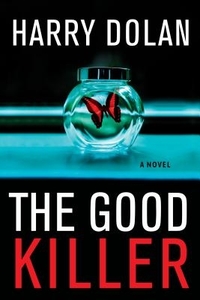The Good Killer by Harry Dolan
 Friday, April 24, 2020 at 7:00AM
Friday, April 24, 2020 at 7:00AM 
Published by Grove Atlantic/Mysterious Press on February 4, 2020
The Good Killer is worth reading just for the epilogue. It balances a dark story with a message of healing, a suggestion that there is a path out of the darkness.
Sean Tennant joined the military with his best friend, Cole Harper. Cole’s brother Jimmy was disappointed that Sean didn’t talk Cole out of the military adventure. Cole lost a foot in the war, for which Jimmy blamed Sean. Later, Sean decided to pursue a theft that went sideways. Jimmy blames Sean for bringing Cole along. Now Sean is on the run from Jimmy. Accompanying Sean are Molly Winter and Cole’s ghost. At least, Sean carries on conversations with Cole, although to others, he seems to be talking to himself.
The victim of the theft, Adam Khadduri, lost cylinder seals valued at a few million dollars. He also lost Molly, or she lost him before telling Sean where to find his valuables. Like Jimmy, Khadduri is trying to track down Sean.
Sean and Molly have new identities and feel reasonably safe until Sean stumbles across an angry man in a mall who is shooting random customers to impress Rose, the woman who rejected him. Sean shoots the killer, saving Rose and earning the status of a folk hero. But since his picture, captured on security cameras, is now on cable news, Sean and Molly need to flee before Khadduri or Jimmy Cole find them.
After the shooting, law enforcement agents who know about his theft are also looking for Sean. He is occasionally recognized by people in small towns, but since Sean and Molly have attained the status of cult heroes, there isn’t much risk that anyone will turn them in. America loves its celebrities.
Some of this seems improbable and forced. In particular, I didn’t buy Jimmy’s vendetta. Khadduri has a stronger motivation to chase down Sean, so the story is at last partially believable. In the end, if a reader can buy into the premise, The Good Killer delivers a satisfying action story.
The law enforcement characters have standard law enforcement personalities. Sean isn’t necessarily an admirable guy, but he at least feels remorse about his reckless behavior, which accounts for the ghost of Cole that he carries in his head. While taking out a mall killer might be seen as an act of redemption, I never entirely warmed to Sean. While I prefer conflicted bad guys to stalwart good guys, Sean seems more like an artificial construct whose job is keep the plot moving than a flesh-and-blood character. The “dead best friend in my head” theme has been done so many times that it comes across as a shopworn tool of the writing trade.
Although I didn’t entirely buy the story and wasn’t in love with Sean, Harry Dolan scores points by underplaying Sean’s ability. He is far from a typical thriller superhero. I was more intrigued by the characters of Molly and Rose, although they both play much smaller roles. In fact, Rose is a negligible character until the epilogue, when she reappears to give the story an emotional power that is absent until that point. The Good Killer is an uneven performance, but it does maintain an escalating level of tension, and its touching epilogue earned it a recommendation.
RECOMMENDED



